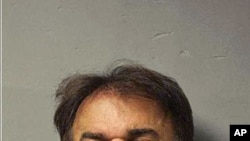The U.N. General Assembly has overwhelmingly condemned Iran for an alleged plot to assassinate Saudi Arabia’s ambassador in Washington.
It sounded like something out of a novel. Last month U.S. officials charged that agents linked to Iran’s powerful Al Quds force were plotting to kill Saudi Arabia’s Ambassador to the United States, Adel al-Jubeir, at a Washington restaurant.
One of the men charged in the scheme - an Iranian with U.S. citizenship - was arrested and has pleaded not guilty. A second man is believed to be in Iran and has not been apprehended.
The two allegedly hired a man they believed to be a member of a Mexican drug cartel to carry out the attack - either through a bombing or gunning the ambassador down. But the would-be assassin also was an informant on the payroll of U.S. authorities and told them the details of the plot, stopping it before it could play out.
Outraged, Saudi Arabia brought a resolution before the 193 members of the U.N. General Assembly Friday condemning terrorism in all its forms, and specifically deploring the alleged plot. It was co-sponsored by more than 50 other member states.
The resolution, which is not binding, was adopted by a vote of 106 in favor, nine opposed and 40 abstentions. It calls upon Iran to comply with all of its obligations under international law - particularly in regard to cooperating with international efforts to bring those involved in the plot to justice.
Saudi Ambassador Abdullah Al-Mouallimi told the General Assembly that the resolution was balanced, and despite evidence pointing to the involvement of Iran or one of its agencies, did not directly condemn either.
Through a translator, the ambassador said, “Justice demands that we give full opportunity to the Islamic Republic of Iran to come clean and to prove its innocence if it is not involved in this plot. This issue is either of two probabilities only: either Iran is confident of its innocence and can refute all the allegations directed to it, in which case it should respond to this call in a confident and serene manner, and to do that as soon as possible. Or, alternatively, Iran or one of its organs or one of its citizens is involved in the plot; in which case it is only natural it will deny and try to avoid assuming its responsibilities.”
Ambassador Al-Mouallimi told reporters after the vote that there is “overwhelming evidence” to implicate elements related to, working for or belonging to Iran’s Revolution Guards Corps in the plot. He said that evidence includes a taped confession, recorded conversations, a trail of money, as well as other intelligence.
Iran’s U.N. Ambassador Mohammad Khazaee objected to the resolution as it was drafted and offered several amendments, which the assembly overwhelmingly voted down. The Iranian envoy said bringing this matter before the General Assembly set a “dangerous precedent” for settling political scores.
“This allegation which is now the basis of this draft resolution is yet another plot, not against the Saudi ambassador, but a plot against my country, and another step along same well known path. Against this backdrop it should not be acceptable for any of us that this General Assembly, too, be used for advancing a political agenda against a member state,” said Khazaee.
U.S. Ambassador Susan Rice said attacks on diplomats - who are considered internationally protected persons - are acts of terrorism. She welcomed Friday’s resolution as a “measured and appropriate response” and noted that a fair judicial process is underway in the United States to prosecute the one suspect who is in custody.
Relations between Sunni Muslim Saudi Arabia and Shiite Iran have been tense for a number of years as the two oil-rich powers look to expand and solidify their supremacy in the region.
| Join the conversation on our social journalism site - Middle East Voices. Follow our Middle East reports on Twitter and discuss them on our Facebook page. |




